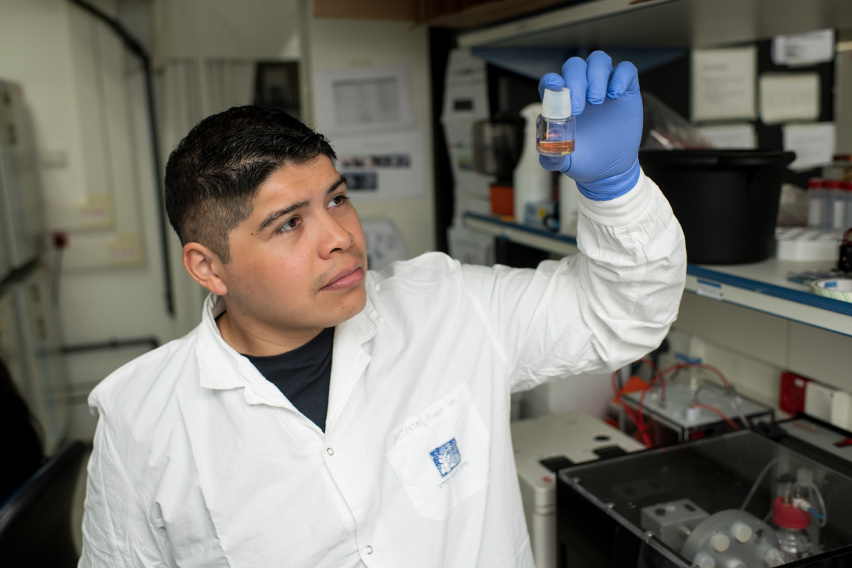
Alejandro Aguilera Castrejón. Photo courtesy of the Weizmann Institute of Science.
MIT Koch Institute
April 26, 2023
Alejandro Aguilera Castrejón an inaugural winner of the Angelika Amon Young Scientist Award in 2022, along with Melanie de Almeida. The award is given annually to two graduate students in the life sciences or biomedical research from institutions outside the United States who embody Amon’s infectious enthusiasm for discovery science. The award was established in honor of Koch Institute faculty member Angelika Amon, who died in 2020 following a two-and-a-half-year battle with ovarian cancer.
Aguilera is currently completing his doctoral work in embryogenesis in the lab of Jacob Hanna at the Weizmann Institute of Science in Rehovot, Israel. In March 2024, he will begin building his lab as a group leader at HHMI’s Janelia Research Campus in Ashburn, Virginia, USA.
Q: What have you been working on during your doctoral work?
A: I develop systems to grow mammalian embryos outside the maternal uterus, specifically the mouse. I’ve created a system that allows you to grow mouse embryos in the post-implantation stage from day 5 to day 11—which is about a third of the total development of the mouse. This period is critical for embryo development because it is when organs start to form. On day five and six, the embryo proper is composed of only one cell type, but after that, it starts to differentiate and establish what will be the head, the tail, and to set the foundations for all the organs in the body. This system will help us understand how organs in a mammalian embryo take shape, but we can do more than that. Researchers had already shown that if you take three different kinds of in vitro cultured stem cells and put them in specific conditions, they will begin to self-organize into an embryo. But in these studies, the embryos stopped developing very early, before they reached the stage where organs begin to form. We were able to use our embryo culture platform to grow these stem cell derived-embryos through organogenesis, and besides, we did this by creating these embryos only from one stem cell type, using genetic modifications. This was really exciting because it was the first time stem cells were used to create embryos that develop to organogenesis in a similar way to natural embryos. By starting with stem cells, you have more control over how you modify the whole embryo or specific parts of it, and you can create far more embryos with stem cells than through fertilization, reducing the use of animals in research.
Q: How will you build on your research at the Janelia Research Campus?
For the first five years in my lab, I want to ask questions about fundamental biology that people weren’t able to answer without such a system. For example, we could knockout genes in the embryo to identify new developmental pathways. Or, we could map out the origin of each cell in an advanced embryo, marking cells with barcodes or genetic modifications to track them as they develop. I’m also interested in comparing the development of the natural embryo with the synthetic embryo. Our stem cell embryos bypass the blastocyst stage of development, and although by day eight the embryos look very similar, we don’t know yet which paths the two kinds of embryos take to reach a similar outcome. We’ll also keep improving the embryo culture platform to make it more efficient and extend how long we can culture a mouse embryo.
Q: What kind of environment do you hope to create in your lab? What kind of mentor do you hope to be to the people working there?
As a student, something that was very important to me was to develop my own ideas, to not only follow my mentor’s lead but find out what’s interesting to me. I would like to foster this. I would like to be a guide to my students and always help them, but also to let them be a little bit independent and to make their own mistakes—because that’s when you learn. I heard that an expert is someone who has made most of the possible mistakes in a narrow field.
I like to ask myself, what’s the difference between a leader and a boss? A boss just cares about getting a job done, not about someone’s development as a person. A leader isn’t looking just to get the most out of someone for the lab, but about how much that person is learning and whether they are getting everything they can from the experience. I hope my lab will be a place where students feel happy, respected, confident, and comfortable talking to me about their ideas. I don’t have that much experience mentoring yet, but I think that for a lot of the time, we can learn together. I don’t think I will be the only expert in my lab, but that my students will also be able to teach me things that I don’t know.
Submissions for the Angelika Amon Young Scholar Award are due by May 31, 2023. If you would like to apply or know someone who should, please visit the award webpage for more details.